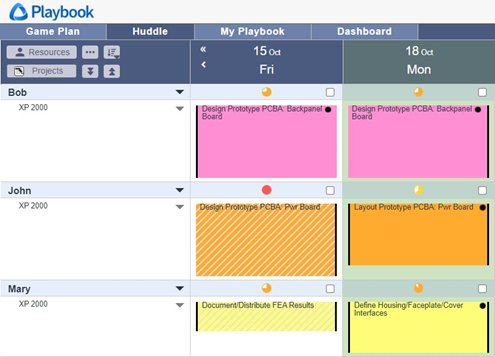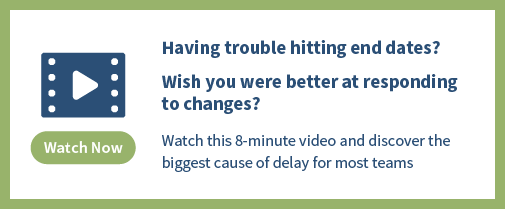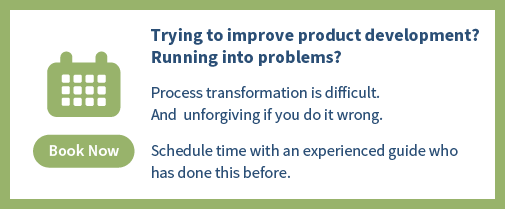Not that long ago multitasking used to be considered a valuable skill. Thankfully that belief has been proven wrong, but for some reason a lot of companies still allow it and a lot of people still do it.
But they wouldn’t if they knew how costly it was.
Like every problem, we can’t solve it unless we know the cause. So here are the most common ones…
- People on multiple projects
- Unclear and/or shifting priorities
- Insufficient plans (lack detail)
- Out of date plans
- Overloaded resources
All of these issues are interrelated which means it’s a self-reinforcing problem. (Which is the worst kind of problem.) But on the positive side, that also means if you fix any of them, all of them will start to improve.
The Damaging Status Report
But there is another less obvious cause for multitasking that is driven by the most common type of project status metric—percent complete.
Asking people to report on percent complete is a complete waste of time for many reasons that I’ll explain in detail in a future post, but one of them is that it promotes multitasking because it makes the team members try to show progress on everything they’re assigned to.
So how do we fix this?
This is common knowledge (or at least logical) but I’ll state it anyway…
The only way to delay a project is to either extend or delay something on the critical path or add something to the critical path.
Conversely, if a task is not on the critical path, it can be delayed until it runs out of slack and becomes part of the critical path before it will impact the end date.
So the simple answer is to always work on things in their “order of importance”, which is determined by how likely it will impact the end date of the project.
And the main variable in “order of importance” is how much slack it has.
How Much Slack Do Tasks Normally Have?
We did some research on a few large projects that we imported and came to a rather surprising discovery…
The average amount of slack on active and completed tasks was 28.6 days.
And those are business days (5), not weekdays (7). So if people are multitasking they are doing so with tasks that have almost six weeks before they need to be completed.
If you asked, most people would say they prefer to stay focused on a task until it’s complete. So why would they be multitasking with work that has six weeks of slack?
- They probably don’t know how much slack their work has.
- Their status reports (“percent complete”) encourage them to “get a little bit done on everything”.
For my fellow data geeks, 52% of the tasks had more than four weeks of slack and highest amount was 125 days. So it’s clear that a lot of people were spending their valuable time on work that had very little chance of delaying the project.
That’s only a problem if they had other work that was more important. And while we did not get to interview the team members when this was going on, we were working with them to help improve their on-time delivery—and late projects and overloaded resources were two of the symptoms (and issues) we were helping them solve.
How can you prevent multitasking?
One possible solution is to implement “block time” where you set aside a two to four hour time period in the morning where no one can schedule meetings unless they’re directly related to project progress.
That might not stop people from unknowingly working on tasks with a lot of slack, but for many people it will allow them to focus and not be interrupted. And it will likely increase the available work time for some people by 50% to 100%—so they will get significantly more work done.
Another solution is to have management prioritize all of the projects and post it so it’s clear which are the most important ones. It's still probable that people will have high priority tasks on low priority projects that they’re not aware of. But at least the most critical projects will get the right attention.
Another solution is to make sure that all of the project plans are accurate so everyone knows the actual amount of slack in all of their tasks. This takes a lot of effort on the part of project managers and usually feels like a waste of time for the team members.
Looking back at the list of causes, the last two solutions for overloaded resources would be to either hire more people or reduce the number of projects they are assigned to. But we know that neither of those are likely to happen.
A simple solution that solves all of the symptoms and issues
All of these solutions have their challenges and that's why we developed Playbook over many years while helping companies with complex projects that have high amounts of uncertainty.
If you implement three simple methods…
- decentralized and rolling wave planning
- frequent standup meetings
- individual task updates
....Playbook will ensure everyone has correct priorities across all their projects every single day.

This allows the subject matter experts to make the correct decisions on their own regarding what to work on. The end result is they feel much less overloaded because they are no longer forced to multitask.
The project managers don't have to ask for meaningless updates and tell people what to do.
The reports are meaningful and always up to date.
The projects are never delayed because the critical tasks were not worked on.
The projects are completed on time (and faster).
If there is a delay, you will find out right away so you have time to fix it.
And there are no late surprises.
If you would like to see a preview of this in action, watch this 8-minute demo.
If you would like to read about how another company went from being fourteen months late to four days early, read this blog post.
If you would like to see more details of how Playbook works, watch this 4-chapter video.
Or schedule time with me to discuss how our Free Trial process works so you can test the methods and software on one of your live projects. There is no obligation and you will know in three weeks whether Playbook will help you achieve predictable end dates.
Here's to predictable end dates!




